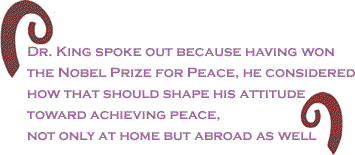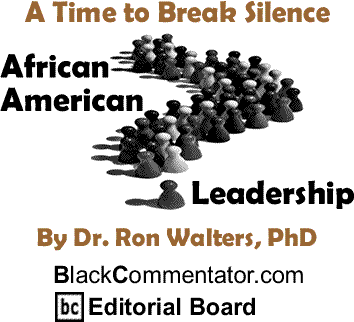
|
||||||||||||||||||||||
|
||
 |
||
Some will notice that the title of this missive comes from Dr. Martin Luther King, Jr.�s speech, �Beyond Vietnam: A Time to Break Silence,� when he challenged the war then being waged in the name of global anti-Communism that conflicted with fighting the evils of racism, militarism and materialism at home. These evils still rage today.
Racism still presides over the attitudes and actions of many who
shoot unarmed Blacks before bringing them to justice, or spit on
Black congressmen, calling them the N� word. Militarism is still
regarded as the ultimate tool by which we regain our revenge and
global standing in Dr. King spoke out because having won the Nobel Prize for Peace, he considered how that should shape his attitude toward achieving peace, not only at home but abroad as well. His first task was to redefine the work of �civil rights� out of the narrow frame of reference that made his friends and allies in struggle think that �peace� was outside of their parameter and castigated him, and others thought that it excluded him not only from participating in international affairs, but in even understanding the issues involved. King, on the other hand, was fighting for a definition of �civil rights� that encompassed human rights and the enrichment of the human condition around the world. We need to think about that today. In other words, many people in this country considered civil rights as a problem of Black people, but he was attempting to move it into the moral center of the country. That is important because, as Rev. Jesse Jackson Sr. has often said, today many consider the Civil Rights movement that is fighting oppression to be on the �Left.� But the issues it raises about fixing home foreclosures, unemployment, poverty, and fairly distributing national resources places it in the moral center. What I think we could not anticipate was that the growth of post-war affluence that built the American middle class would also strengthen a self-centered materialism that would resist the expansion of human rights to other people. Thus, the fight to extend health care to 30 million more people should be a moral calling that should excite rather than annoy us; it raises the contradiction of Tea Partiers and others opposing health care for Americans, moving past the moral question to the political view that it expands the size of government. Why are moral institutions not challenging this?
Let me add my voice to those who have concluded that the comparison between President Obama and Dr. King is the wrong one, and that Obama is not the fulfillment of Dr. King�s dream. I would concede that he is one of the shining elements of that fulfillment, but that Dr. King�s dream was focused not on individuals but on the well-being of Black people, the nation and the oppressed around the world. President Obama himself acknowledged,
in his Nobel Prize speech, that he and Dr. King had different roles
in history and therefore, different responsibilities. He went on
to say that there were times when the use of violence for a righteous
(such as 9/11) cause was justifiable and an action that furthered
the human condition. I believe that too. But I also believe that
the use of American military power in pursuit of a war in
BlackCommentator.com
Editorial Board member,
Dr. Ron Walters,PhD is a Political Analyst, Author and Professor
Emeritus of the |
||
If you would like to comment on this article, please do so below. There is a 400 character limit. You do not need a FaceBook account. Your comment will be posted here on BC instantly. Thanks. Entering your email address is not mandatory. You may also choose to enter only your first name and your location.
|
||
Thank you very much for your readership. |
||
| Any BlackCommentator.com article may be re-printed so long as it is re-printed in its entirety and full credit given to the author and www.BlackCommentator.com. If the re-print is on the Internet we additionally request a link back to the original piece on our Website. | ||
| |
||
April 8, 2010 |
| Executive Editor: David A. Love, JD |
| Managing Editor: Nancy Littlefield |
| Publisher: Peter Gamble |
| Est. April 5, 2002 |
| Printer Friendly Version in resizeable plain text format |
 |
 |
 |

|
 |
| |
| |


































 Today
in
Today
in 










